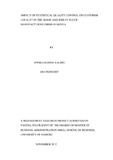| dc.description.abstract | Firms are faced with problems arising from emergence of new technologies and shifts in consumer demands. Such problems have increased the complexity and range of
issues to consider when making decisions. In an attempt to improve quality and reduce costs of maize and wheat flour, every firm in the industry is striving to cope
with such problems and remain competitive. The primary objective of this study was to determine the extent to which SQC procedures are applied in the maize and wheat flour manufacturing firms in Nairobi, Kenya and to evaluate the impact of its application on customer loyalty. The study also sought to establish the challenges faced by these firms in the application of SQC.
This research was conducted through a survey method with a population consisting of 10 maize and wheat flour manufacturing firms in Nairobi. A census approach was
used because it was easy to reach all the mentioned firms which were located at one region. The study used primary data obtained using questionnaires which had targeted the firms' management team, the support staff and customers. These questionnaires were distributed to all the firms as well as customers.
The impact of application SQC procedures can affect customer loyalty because customers tend to shift from one manufacturer to another in search of value for their
money. The study found out that customers valued quality and would be willing to pay more for products with higher quality. While the manufacturing firms strived to meet customer.expectations, there were also , challenges associated with the implementation of the quality control procedures.
Some of these challenges which the study identified hindered the implementation of quality control procedures in the industry. Finally, since problems associated with quality have the potential of recurring, the study has recommended that manufacturing firms have to continually design and implement appropriate strategies to overcome the negative impacts of poor quality. These recommendations are aimed at helping the firms in the industry on how to satisfy customers by applying SQC procedures. | en_US |

